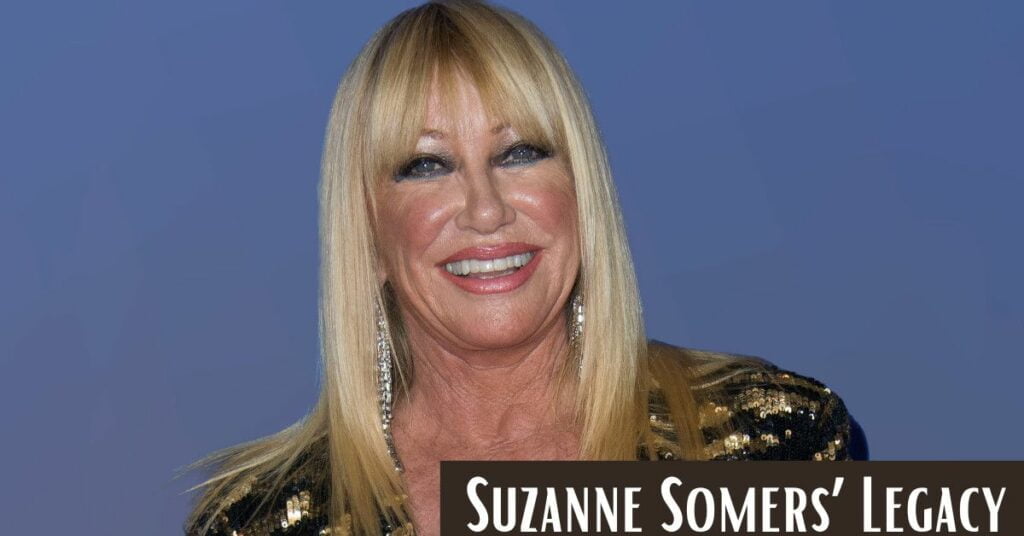Suzanne Somers came before Gwyneth Paltrow, Jenny McCarthy, and Dr. Oz. Somers, who passed away on October 15 at age 76 from complications related to breast cancer, was one of the first celebrities to take on the position of wellness guru. She used the notoriety she gained from her time as a comedy star to launch a second career as a health and beauty guru.
University of Alberta professor and author of “Is Gwyneth Paltrow Wrong About Everything?” Timothy Caulfield noted that even if today’s youth may not be familiar with Somers, they are nevertheless affected by her legacy. According to Caulfield, it was Somers who “created the template that we see over and over again.“
Star of the 1970s–1980s sitcom “Three’s Company,” Somers sold millions of ThighMasters to women who aspired to have her Barbie body. Fans felt a special connection to Somers because of her honesty about overcoming obstacles including her father’s alcoholism and her battle with cancer.
However, Somers was criticized for encouraging women to disregard conventional medicine. She said that, despite her doctor’s recommendation, she had chosen to forego treatment. She advocated “bioidentical hormones,” a possibly harmful therapy for menopause, as a safer alternative to pharmaceutical options.
Somers appeared on “The Oprah Winfrey Show” to detail her extensive beauty routine, which included injecting vaginal hormones and taking 60 tablets everyday to keep her appearing young and seductive. On October 17, obstetrician and gynecologist Dr. Jen Gunter said on her blog, “She became an influencer on menopause before being an influencer was even a thing.”
Nearly on his own, “Somers almost single-handedly vaulted a fringe, untested medical hypothesis into the mainstream.” Any postmenopausal woman on hormone replacement therapy is at danger, but those with estrogen-driven breast cancer are at an even higher risk.
According to Gunter, who noticed that interest in bioidentical hormones would increase after the release of Somers’ books and television appearances, this advice was risky then and is risky now. According to Google Trends, there was another spike in interest when the news of Somers’ death was released.
Johns Hopkins University professor and oncologist Otis Brawley expressed concern that Somers’ negative attitude about chemotherapy may have dissuaded other breast cancer patients from undergoing treatment, despite the fact that it improves survival rates despite unpleasant side effects including nausea, vomiting, and hair loss.
“I personally know of several women who have died” after deciding against breast cancer therapy “that had a high likelihood of curing them,” Brawley added. “She was literally scathing if someone suggested something be tested scientifically,” he added, despite Somers’ cheerful public persona.
The spokesperson for Somers declined to comment for this piece. Somers has advocated for alternative medicine practitioners, especially those who promote dubious or discredited therapies, in her books and talks with the media.
The Texas Medical Board punished Houston doctor Stanislaw Burzynski for deceiving patients in their latter stages of illness and neglecting to explain potential hazards linked with his treatment. Despite the industry’s use of idyllic images like beaches and flowering meadows in its advertising, “underneath that is a lot of fear-mongering and anger and rage,” Caulfield remarked.
Jenny McCarthy, a former Playboy model and actress, remade herself as a health champion in 2007, echoing Somers’s example by spreading the false claim that vaccinations cause autism and questioning the motivations of physicians who suggest them.
McCarthy famously told Oprah Winfrey that she got her knowledge regarding vaccine safety from “the University of Google,” a phrase that has been adopted by modern anti-vaccine campaigners who prefer to conduct their own research rather than rely on the advice of experts.
According to Gunter, author of “The Menopause Manifesto,” there is a direct correlation between the alternative remedies that Somers advocated and the current wave of online conspiracy theories. “If alternative medicine worked, everyone would be using it,” Gunter said. “So there has to be an excuse for not using it, like a conspiracy.”
According to Gunter, some famous people “really believe they have this special ability to suss out the truth about medicine.” To paraphrase, “You can only believe that if you have a narcissistic belief in yourself.” Actress Gwyneth Paltrow has also created a beauty and health empire through her website Goop, where she sells a variety of questionable items.
Paltrow has advocated a variety of alternative health practices, including vaginal steaming with mugwort to “balance” female hormones and cleanse the uterus and vaginal placement of jade (or yoni) eggs to enhance orgasms. However, nowadays, all one needs to become a health influencer is a TikTok account—no celebrity status is required.
The internet is full with potentially harmful medical myths. Videos describing ingrown toenail removal, mole removal, and even using nail files to sharpen teeth are particularly unsettling.
According to Jessica Gall Myrick, a professor of media studies at Penn State University, “breaking the fourth wall” by speaking directly to the camera is a strategy utilized by modern health influencers like Suzanne Somers that can strengthen the connection between the speaker and the audience.
“That’s probably why Somers was so influential,” Myrick said. “She talked directly to people through mass media. She was using mass media then the way people use social media today.”
I can now say my dreams have come true because of you. You can always get the most recent news updates on our website, newswatchlist.com.
You might additionally consider the following options:
